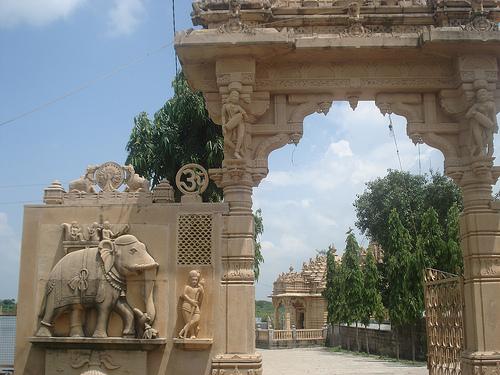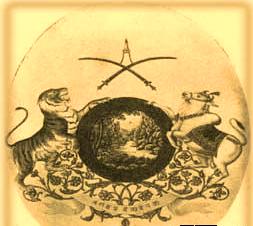
History of sirohi Rao Sobhaji founded the town of Shivpuri on the western slope of Siranwa Hill in 1405. Shivpuri today lies in ruins. In 1425, his son and successor, Sehastramal , founded a fortress on the eastern slope of the same hill, which became his capital and grew into the present-day town of sirohi. During the early years of the 19th century, sirohi suffered much from wars with Jodhpur and the Meena hill tribes of the area. The protection of the British was sought in 1817 the pretensions of Jodhpur to suzerainty over sirohi were disallowed, and in 1823 a treaty was concluded with the British government. sirohi became a self-governing princely state within British India, and part of the Rajputana Agency. For services rendered during the Revolt of 1857, the Rao received a remission of half his tribute. The state was traversed by the Rajputana Railway in the 19th century, and a station was built at Abu Road, 28 miles south of the town of sirohi. Rao Keshri Singh (ruled 1875-1920) and his successors were granted the title Maharao (equivalent to Maharaja) in 1889. In 1901 the population of the town sirohi was 5651. The state manufactured sword-blades and other weapons, but little else. In 1901 the gross revenue of the state was approximately Rs 28,000, and the tribute to the British Raj was set at a mere Rs 450. The Crosthwaite Hospital was opened by Sir Robert Crosthwaite in December 1897.  sirohi was founded by the Deoras. The founder of the Deoras dynasty was Deoraj. Rao Sobhaji, the 6th descendent of Rao Deoraj, founded the town of Shivpuri in 1405. Latter in the year 1425, his son Sehastramal founded a fortress, which became the capital and turned into present day town of sirohi. During the 19th century, many wars were fought between the hill tribes of the area. In 1817, the protection of the British was sought and finally in1823 a treaty was concluded with the British government. sirohi became a part of Rajputana Agency and a self governing princely state within the British India. "sirohi" as Colonel Mellson rightly remarked "is the one domain in Rajputana which maintained its Independence, acknowledging the suverainty of neither Mugal, Rathores, nor Maratha" . The princely house at sirohi is an offshoot of the same branch, Chauhan, to which the last Hindu Emperor of India belchged. Historic pride Clings to masses as much as to Individuals, Condueing to honorable pride when rightly felt, and to none can it therefore cling more firmly than to "the Magnificiently Stubborn Deora," the particular seet at the Chauhans who have ruled over sirohi during the past six centuries. The meaning of sirohi is " Self Respect is most important even if head may be detached " in other words "A Rajput of sirohi may die for Self Respect" . sirohi, is said to have taken its name from sirohi from Siranwa hill, on the western slope at which it stands. Colonel Tod had suggested the name at the terrirory might have been derived from its position at the head (Sir) of the desert (Rohi). |

